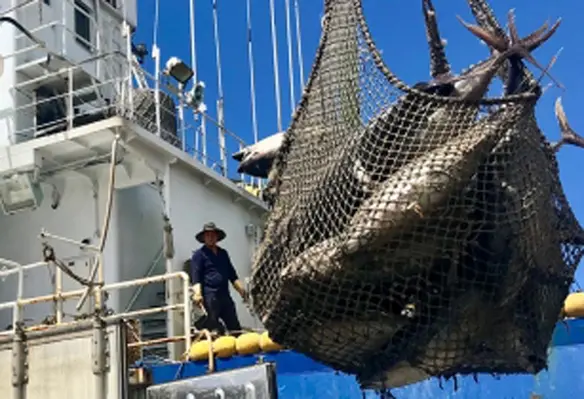Ocean Outcomes has received a new three year US$1.9mn dollar investment to scale up its sustainable tuna initiatives across Northeast Asia
The investment will aim to drive further change in longline tuna management and production and support the development of a high seas fisheries strategy to replicate improvement successes in like-fisheries.
Daniel Suddaby, vice president of strategy and impact at Ocean Outcomes said, “We have already brought about 10% of Northeast Asian longline tuna vessels into projects working towards improved practices for the first time. This includes helping one of the world’s largest tuna traders, FCF, move their entire supply chain into certification. Our vision, with generous support from the Moore Foundation, is to build on this success, tripling the number of vessels in improvement projects in the region.”
Approach towards tuna sustainability
In addition to increasing the number of vessels adhering to best practices such as an increase in observer coverage and the adoption of bycatch mitigation techniques, Ocean Outcomes intends to build a foundation for greater impact in the region at a management level.
The company aims to accomplish this by focusing on growing existing projects, partnerships and on the ground capacity in China and Japan, while also establishing new vehicles for change in South Korea. The focus of the work includes:
·Supporting the development of improved national fishery management in mainland China, Japan, South Korea and Taiwan.
·Establishing better catch and bycatch monitoring systems on hundreds of longline tuna vessels currently engaged in Fishery Improvement Projects (FIPs) and MSC certification.
·Facilitating collaborative mechanisms to harmonise tuna improvement actions among involved large-scale tuna companies in the regionBuilding capacity in South Korea.
To support these goals, Ocean Outcomes has also appointed Doohyun Park, a fisheries expert and tuna industry advisor based in Seoul, South Korea. Park will work directly with both fishing fleets and their industry associations in the greater Northeast Asia region.
“Korean tuna and high seas fisheries fleets produce staggering amounts of seafood, and with such production comes challenges and a responsibility to ensure sustainable practice. If upstream supply chains want to meet their sustainable tuna sourcing goals, we must work closely with the catching sector in Korea to help collaboratively solve these challenges,” said Park.
With partnerships, on the ground capacity and tuna projects in mainland China, Japan, South Korea and Taiwan, the company is scoping a higher level regional strategy to address sustainability needs in other, overlapping high seas fisheries, such as for small pelagics and squid.
Suddaby opining about the regional approach said, “We have worked collaboratively with FCF and Bumble Bee, helping them implement their FIP and MSC certification needs, and are advising Bumble Bee and others on tuna sustainability in the region. We believe these successes can be replicated and scaled. Our goal is to bring together companies engaged in tuna and high seas fisheries, to jointly overcome the challenges with these fisheries.”




